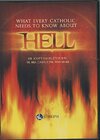Stephen K. Ray
Autore di Crossing the Tiber: Evangelical Protestants Discover the Historical Church
Sull'Autore
Fonte dell'immagine: Stephen K. Ray
Opere di Stephen K. Ray
Upon This Rock: St. Peter and the Primacy of Rome in Scripture and the Early Church (Modern Apologetics Library) (1999) 238 copie
Mary: The Mother of God, The Footprints of God, The Story of Salvation From Abraham To Augustine (2001) — Narratore — 72 copie
Born Again? Faith Alone? 12 copie
Opere correlate
Etichette
Informazioni generali
- Sesso
- male
Utenti
Recensioni
Potrebbero anche piacerti
Autori correlati
Statistiche
- Opere
- 43
- Opere correlate
- 1
- Utenti
- 1,193
- Popolarità
- #21,548
- Voto
- 3.9
- Recensioni
- 8
- ISBN
- 24















